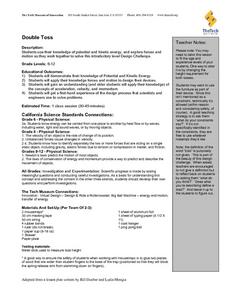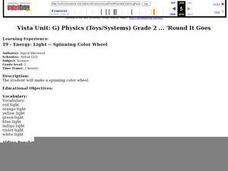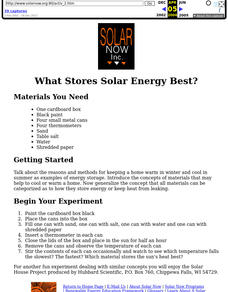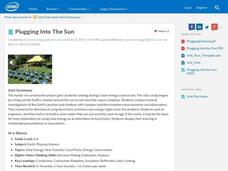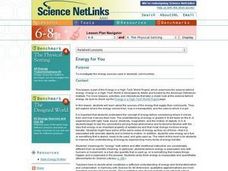Curated OER
Cooler In The Shadows
Students investigate the concepts of shadows and how they are projected with objects different positions in relation to the sun. They conduct an experiment by observing objects in different positions. Then students record the observations.
Curated OER
Gallery Walk Questions on Earth's Radiation Balance
Questions that can be used in a instructional activity on Earth's radiation balance are suggested in this resource. It is not a lesson plan, per se, but it is a list of questions for stations within a "Gallery Walk" instructional...
Curated OER
Cost Effective Buying
Students evaluate energy-related purchases. In this consumer awareness lesson, students visit an appliance store and rank the products' cost effectiveness by using a mathematical formula.
Curated OER
Keeping Warm
There are five separate lessons about heat in this collection of slides. Young scientists learn how to use a thermometer to measure temperature, and they experiment with insulators. You can use one of these lessons each day for a full...
Curated OER
Double Toss
Students experiment with potential and kinetic energy. They design a device that will toss a ball at least 30 centimeters, catch it and to the ball up again.
Curated OER
Albedo and Irradiation of Surfaces
Here is a physical science activity where pupils place thermometers inside of a white and a black paper pocket and place them under a lamp. They record and compare the temperature increase over a ten-minute period. Have your class...
Curated OER
What Are You Eating?
Discover the calorie content of foods by observing how much heat they produce in water. If you have a calculator-based laboratory (CBL™) insturment for collecting data, then this laboratory worksheet will not need any changes. If not,...
Curated OER
Science Jeopardy - The Earth Sciences
The earth sciences are the focus for this Jeopardy-style review game. Categories include geology, space, scientific investigation, meteorology, and oceanography. Diagrams and pictures are involved with most of the questions, making this...
Weebly
Definitions of Conduction, Convection, and Radiation
There's quite a bit in this physical science packet. First, how is heat transferred? Learners read a brief explanation of conduction, convection, and radiation before identifying common occurrences (with pictures) as one of the three....
Curated OER
Biomass: The Energy of the Future
Sixth graders examine information about a variety of renewable fuels. They read key vocabulary terms, read and discuss a story handout, and conduct research on renewable fuels. Students then complete a comparison chart, and write an...
Curated OER
Solar S'Mores
Students see that solar energy is the energy given off by the sun. They explain that when light energy is absorbed by objects it is changed to heat energy and that dark-colored objects absorb more light and store more heat from sunlight.
Curated OER
Energy: Light -- Spinning Color Wheel
Second graders make spinning color wheels to determine how energy effects what colors look like. They paint or color a color wheel with the seven colors of the spectrum. Next, the spin the wheel to determine what happens. In order to...
Curated OER
What Stores Solar Energy Best?
Students discuss reasons and methods for keeping a home warm in winter and cool in summer as examples of energy storage. Students participate in a solar energy experiment.
American Chemical Society
Changing State: Evaporation
Why do experiments require a control? Guide scholars through designing an experiment to see what they can do to evaporate water faster with a lesson plan that stresses the importance of controlling all variables. The second activity...
US Department of Energy
Thermodynamics—Teacher Guide
I'm so cool! No, you're exothermic. This thermodynamics lab unit includes an introduction, teacher demonstrations, six labs that students rotate through each class day, homework assignments, application of knowledge, and assessments....
Intel
Plugging into the Sun
What's cooking? A sizzling STEM unit challenges scholars to build a solar cooker that can successfully cook an egg. The unit opens with a study of Earth's rotation, the sun's energy, and shadows. Pupils use a compass and thermometer to...
Curated OER
Solar S’Mores
Learners use the energy of the sun to make s'mores. In this solar energy lesson, students gather the listed materials and follow the procedures to find out if they can make s'mores using solar energy.
Curated OER
Applied Science - Physics Post-Lab
Students investigate energy. In this Physics lesson, students explore different sources of energy: heat, nuclear, and chemical. Students sing an electricity song.
Curated OER
Cooler in the Shadows
Students explore how the amount of sunlight and heat change in areas that are shaded.
Curated OER
Energy for You
Students investigate the energy sources used in student's communities. They explore where the energy comes from, how it is transported, and the uses to which it is put. They review the meanings of vocabulary renewable and newable resources.
Curated OER
Conversion of Energy Into Different Forms
Students study energy conversion and the forms energy may take. In this energy conversion lesson, students study energy conversions in flash paper, rubber bands, mechanical cranks, and a radiometer.
American Chemical Society
Entropy and Enthalpy Changes
My room isn't messy — it's a scientific experiment in entropy! Scholars investigate entropy, enthalpy, and spontaneity through a guided procedure and set of questions. The lesson connects the Second Law of Thermodynamics, energy transfer...
Scholastic
Spring Is Sprung: Water Movement in Plants
Young scientists use food coloring and celery stalks to determine how water travels through plants.
Curated OER
Dinnertime for Animals
Is a deer an herbivore? What about a spider? Experiment with the food chain in an interactive science experiment. After listing the herbivores from a selection of animals, third and fourth graders compare the skulls and teeth of...






